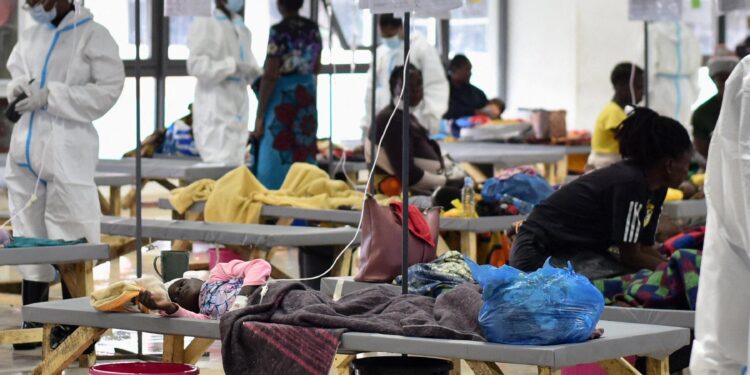Sudan’s Khartoum Faces Critical Cholera Epidemic Amidst Humanitarian Crisis
Khartoum, the capital city of Sudan, is currently battling a severe cholera epidemic that has tragically resulted in over 70 deaths within a mere 48 hours. This alarming surge in cases is deeply intertwined with the worsening humanitarian conditions fueled by ongoing political instability and armed conflict. Healthcare facilities are overwhelmed as they struggle to accommodate the growing number of patients, while essential medical supplies and clean water remain scarce. This article explores the unfolding cholera crisis in Khartoum, its profound effects on vulnerable populations, and the coordinated international efforts aimed at curbing this public health emergency.
Cholera Crisis in Khartoum: A Growing Threat to Public Health
The rapid escalation of cholera infections across Khartoum has escalated into a dire public health emergency. The death toll exceeding 70 individuals within just two days underscores an urgent need for swift containment measures. The outbreak thrives amid widespread deficiencies in sanitation infrastructure and limited access to safe drinking water—conditions exacerbated by displacement and overcrowding due to ongoing conflicts.
Health authorities alongside global organizations are mobilizing swiftly to address these challenges through targeted interventions designed to halt transmission chains and provide critical care for those infected. Residents face mounting anxiety as fears grow over their safety amidst deteriorating living conditions.
Key Interventions Underway
- Provision of Safe Water: Distribution campaigns supplying potable water aim to reduce exposure risks.
- Community Hygiene Education: Awareness programs focus on recognizing symptoms early and promoting handwashing practices.
- Treatment Facilities: Establishment of specialized centers offering rehydration therapy and antibiotics for affected patients.
A collaborative framework involving local health departments working closely with international partners remains vital for developing adaptive strategies that can effectively contain this outbreak while strengthening Sudan’s fragile healthcare system against future epidemics.
Crisis Management: Strategic Recommendations for Containment & Prevention
The escalating cholera situation demands immediate implementation of comprehensive prevention tactics combined with robust response mechanisms. Prioritizing extensive public health education initiatives, particularly emphasizing proper sanitation habits such as regular handwashing with soap, is crucial in halting disease transmission within communities.
An urgent expansion of emergency treatment centers staffed by trained healthcare workers will facilitate timely medical intervention essential for reducing mortality rates. Partnering with local non-governmental organizations enhances resource distribution efficiency across affected neighborhoods facing logistical challenges due to infrastructural damage or insecurity concerns.
A significant component involves upgrading water supply systems through distribution of chlorine disinfectants along with secure storage containers designed specifically for household use—measures proven effective during recent outbreaks globally (e.g., Yemen’s 2023 cholera response). Additionally, instituting continuous epidemiological surveillance enables real-time tracking enabling rapid containment responses before further spread occurs.
| Main Focus Area | Critical Actions Required |
|---|---|
| Aware Communities | Create widespread hygiene awareness campaigns targeting all age groups; |
| Treatment Access Expansion | Erect additional dedicated cholera treatment units; |
| Cleansed Water Supply Enhancement | Distrubute chlorination kits & promote safe water handling; |
| Disease Monitoring Systems Strengthening | < td > Deploy active case finding & reporting mechanisms;
The Role of Global Support Coupled With Local Healthcare Strengthening Efforts
This devastating outbreak highlights an acute necessity not only for immediate humanitarian assistance but also long-term capacity building within Sudan’s healthcare framework. International aid agencies have been urged urgently to deliver lifesaving commodities such as oral rehydration salts (ORS), intravenous fluids, antibiotics, and hygiene kits critical for patient recovery.[1].
Beyond material support, empowering frontline medical personnel through specialized training workshops focused on managing infectious diseases like cholera can significantly improve patient outcomes during crises like this one.[2]. Moreover, investments aimed at rehabilitating basic infrastructure—including clean water provision systems and adequate sanitation facilities—are indispensable steps toward preventing recurrent outbreaks under similar socio-political stressors seen today across many parts of Africa.[3].
- < strong >Monetary Aid:< / strong > Funding allocated towards procurement & distribution logistics ensuring uninterrupted supply chains;< / li >
- < strong >Capacity Building:< / strong > Training programs enhancing clinical skills related specifically to epidemic control;< / li >
- < strong >Infrastructure Development:< / strong > Construction or repair projects focusing on sustainable access to potable water & waste management;< / li >
< / ul >< th >< b >Support Category< / b >< th >< b >Description< / b >
< /thead >< td >Financial Assistance< / td >< td >Critical funding supporting procurement efforts & facility upgrades< / td > < td >Training Initiatives< / td >< td >Workshops improving frontline worker readiness against outbreaks< / td > < td >Infrastructure Enhancement< / td >< td>Sustainable development projects targeting WASH (Water Sanitation Hygiene) improvements
(aligned with WHO guidelines)
Tackling this crisis requires harmonized action combining international expertise alongside grassroots community engagement — fostering resilience not only against current threats but also future epidemics potentially triggered by climate change impacts or continued instability. Building stronger healthcare networks now lays groundwork essential beyond today’s emergency response efforts.
Synthesizing Lessons: Moving Forward From Sudan’s Choleral Outbreak
The sudden spike in fatal cholera cases sweeping through Khartoum starkly reveals vulnerabilities embedded deep within Sudan’s public health landscape amid protracted conflict zones affecting millions regionally.
Medical institutions strained beyond capacity coupled with insufficient preventive infrastructure compound risks faced daily by residents already burdened from displacement hardships.
As global partners rally resources urgently needed,healthcare providers continue relentless efforts aiming both at containing current infections while advocating systemic reforms addressing root causes behind recurring epidemics throughout East Africa.
Only through sustained commitment encompassing education campaigns,
improved WASH services,
enhanced surveillance capabilities,
and strengthened cross-sector collaboration can further loss be prevented—and lives saved—in what remains one among many pressing humanitarian emergencies worldwide today.
